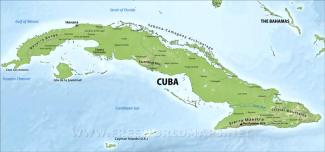Cuba as a Bio-weapon Free Zone?
Intelligence is the first line of defence in any war; unfortunately for the Americans, this most important aspect of war was the weakest link during the recent Iraq confrontation. Their failure to find Weapons of Mass Destruction (WMDs) in Iraq made them realise the need for reassessment of overall intelligence-gathering procedures. The recent re-evaluation by adopting more stringent standards towards analysing their earlier estimates about Cuba’s bio-weapons programme has made them conclude that Cuba has no active bio-weapons programme. This announcement is in contradiction to the earlier belief that Cuba has an active bio-weapons programme, and it is sharing these secrets with a few other ‘rogue’ nations, including Iraq. The earlier assessments were put forth during the year 1999. As per the latest updated intelligence inputs, Cuba still has the technical capability to pursue some aspects of biological weapons but is no longer continuing with any offensive weapon development programme or is sharing intelligence with other interested States.
Interestingly, the same Bush administration is giving a clean chit to Castro, whose few officials only during March 2004 were of a strong opinion that Cuba's biological weapons (BW) programme is at a more advanced stage than officially being acknowledged. There were also reports that P-4 containment systems used to store the deadliest toxins were identified at suspected bio-weapons labs inside Cuba.
At that time, the American intelligence community had differing opinions regarding disclosing these secrets for public consumption. One group was of the opinion that an open hearing on this issue would provide ‘feedback’ to Cuba on how much the Americans know about its BW effort while the other group wanted to ‘expose’ Cuba internationally. Undersecretary of State for Arms Control and International Security, John Bolton was supposed to deliver details of the Cuban programme to the Senate Foreign Relations Committee in June, post 9/11, but the intelligence bureaucracy suppressed the testimony. It has been reported that Bolton was of the opinion that Cuba's biological weapons could include anthrax, smallpox and variants of encephalitis such as West Nile virus.
Recent outbreaks of West Nile virus that have killed more than 30 Americans and infected another 675 have been traced to birds that may have been infected at Cuban bioweapons labs. Cuba’s record in the field of Chemical Warfare is also not very encouraging. Cuba had reportedly used weaponised poison gas against South African troops and forces from the National Union for the Total Independence of Angola (UNITA). Also, Cuban-supported rebels of the Revolutionary Armed Forces of Colombia had used poison gas in an attack on the Colombian town of San Adolfo recently. Defected Cuban scientists and Ken Alibek, former deputy director of the Soviet Biopreparat, provided major evidence about Cuba’s bio-weapons programme during the 1980s and 1990s.
Against the backdrop of the above, the latest announcement just before the US Presidential elections came a bit as a surprise, particularly when, on every available forum, Bush was justifying the invasion of Iraq and continuing war against WMDs. The recent history indicates that Cuba and its bio-weapons programme were perceived differently by Democrats and Republicans. Clinton's administration was averse to taking any action against Cuba on the intelligence inputs made available to him. Ironically, in 1994, Clinton banned U.S. intelligence agencies from conducting covert operations in Cuba. In 1998, his Defence Secretary William S. Cohen stated that he was “concerned about the use of Cuba as a base for intelligence activities directed against the United States” and “Cuba's potential to develop and produce biological agents, given its biotechnology infrastructure.” As per him, “Cuba's biotechnology industry was one of the most advanced in emerging countries and capable of producing biological warfare agents.” However, his views were not taken seriously.
Also, former President Jimmy Carter had put the Bush government in a quandary. Carter (2002) said that Bush administration officials who briefed him before his trip to Cuba never mentioned any concerns about Cuban involvement in developing biological weapons when Powell had opined that Cuba could produce biological weapons. Carter had also claimed that he did not believe Cuba was collaborating with Libya in biological research, adding that its scientific relations with Iran conformed to international standards.
Probably now, after the Iraq WMD disaster, the CIA is adopting very strict methods to decipher the intelligence inputs, or even there exists a possibility that with the recent overhaul of the CIA, a pro-Castro lobby has become more active, which is driven by an increasingly powerful business lobby of food producers, farming interests and pharmaceutical companies eager to trade with Cuba.
This entire episode significantly highlights the difficulties in carrying out the exact threat assessment of bio-weapons. It is not possible to say with any certainty what exactly is occurring in Cuba today with biological warfare activities because of the presence of dual-use technologies. Under such circumstances, the recent assessment of the Americans may even be incorrect.
